As an Amazon Associate, as well as an affiliate of other programs, I earn from qualifying purchases. This may influence which products I write about and where and how the product appears on a page. However, this does not influence my evaluations or recommendations. My opinions are my own.
Have you ever wondered if someone in your life is playing mind games? You’re not alone. In fact, 1 in 4 people report experiencing manipulation in their relationships. This article delves into understanding and overcoming such dynamics, exploring the subtle signs and effective strategies to navigate these complex interactions. Join me in uncovering the truth about manipulation and learn how to shield your relationships against these hidden influences.
I’ve always been fascinated by the complexities of human relationships. They’re like intricate dances, sometimes beautiful, sometimes a bit confusing. Recently, I shared a quote that really struck a chord: ‘Manipulation is when they blame you for your reaction to their disrespect.’ Wow, did it resonate with people! It went viral, sparking incredible discussions and shared stories. This made me realize how vital it is for us to talk about and understand manipulation in our interactions.
So, what is manipulation in relationships?
It’s like a shadow that can darken our connections, often so subtly that we don’t even notice it at first. It twists our reality, shakes our confidence, and can leave us questioning our own minds. But here’s the deal – we can learn to spot it, understand it, and deal with it.
In this article, I want to explore the many faces of manipulation and its impact on our self-esteem and mental health. More than that, I want this to be a two-way conversation. Your experiences, insights, and stories are incredibly valuable. Let’s learn from each other, support each other, and grow together.
Remember, every one of us has something to contribute to the conversation. So, as you read, I encourage you to share your thoughts, experiences, and wisdom. Hoping together, we can shed light on this topic and empower ourselves to foster healthier, more authentic relationships.
What Defines Manipulation?
Let’s start with the basics. Manipulation in relationships occurs when someone attempts to control or influence another person in a way that’s not honest or fair. This behavior can manifest in various forms, ranging from subtle tactics like guilt-tripping to more overt actions such as lying or intimidation. Imagine a partner who consistently makes you feel like you’re in the wrong, even when you’re not. That’s a classic example of manipulation.
So, how can you tell if you’re dealing with manipulation?
Keep an eye out for signs like feeling guilty all the time, having your actions constantly questioned, or being isolated from friends and family. It’s like being in a puzzle where you can’t find all the pieces.
For a detailed overview of key signs you are being manipulated, please refer to the accompanying infographic below.
Impact on Individuals:
So what are the real consequences? When manipulation creeps into a relationship, it can destroy your self-esteem, making you doubt your worth. It messes with your mental health, leaving you feeling anxious or depressed. And worst of all, it can cloud your judgment, making it hard to make decisions that are truly right for you.
Remember, you’re not alone in this. Many people go through similar experiences, and we’re here to help you navigate the world of manipulation in relationships. Stay tuned as we uncover more insights and offer practical advice to empower you in your relationships.
Dr. Jordan Peterson offers valuable insights on dealing with manipulative individuals in this brief yet informative video. His perspective can provide additional depth to our understanding of manipulation in relationships. Whether you’re looking to identify manipulative behavior or seeking strategies to handle it, this clip is a must-watch: Dr. Jordan Peterson Talks About Manipulative People.
Gaslighting Uncovered: Leading the Way in Understanding Manipulation in relationships

Gaslighting a form of psychological manipulation where a person is made to doubt their own perceptions, memories, or judgment, often by someone close to them. This image is trying to convey several key messages to the reader:
- Distorted Reality: The distorted mirror represents how gaslighting warps a person’s perception of reality. Just as the mirror doesn’t reflect a true image, gaslighting distorts the truth, making the victim question what is real and what isn’t.
- Inner Confusion and Turmoil: The individual’s expression of bewilderment or contemplation in the image reflects the internal conflict and confusion experienced by someone who is being gaslit. It shows the struggle to reconcile their own understanding with the altered reality presented by the manipulator.
- Psychological Impact: The surreal and slightly unsettling atmosphere of the image highlights the psychological impact of gaslighting. It’s not just about being lied to; it’s about having one’s sense of self and grasp on reality systematically undermined.
- Empowerment through Recognition: By recognizing the concept of gaslighting (as depicted in the image), the viewer is invited to understand and identify such manipulation in their own lives or in the lives of others. This recognition is the first step towards addressing and overcoming the impact of gaslighting.
In summary, the image aims to visually represent the confusion and distortion of reality caused by gaslighting, while also encouraging the viewer to acknowledge and confront this form of manipulation. It’s about bringing a hidden, psychological battle into the light, emphasizing awareness, and the journey towards clarity and self-trust.
Turning the Tables: Smart Strategies Against Gaslighting.
 The first step…
The first step…
is to trust your own experiences and feelings. Remind yourself that your perceptions are valid. It can be helpful to keep a journal or record of events and conversations, which can serve as a grounding tool when your memory or perception is challenged.
Seeking support…
from trusted friends, family members, or a professional can also provide an external perspective and validation. These connections can help you see the situation more clearly and reaffirm your sense of reality.
Setting clear boundaries…
with the person gaslighting you is crucial. Clearly communicate your stance and, if necessary, be prepared to distance yourself from the relationship or situation to protect your mental and emotional well-being.
Remember, overcoming gaslighting is about re-establishing your confidence in your own perceptions and taking steps to protect yourself from further psychological harm. With the right tools and support, it’s possible to navigate out of the fog of gaslighting and regain control over your own reality.
 The Many Faces of Manipulation: Not Just Gaslighting
The Many Faces of Manipulation: Not Just Gaslighting
Manipulation in relationships can take various forms, each with its own nuances. Understanding these types can help in recognizing and addressing manipulative behaviors. Here are some common types of manipulation:
1. Emotional Manipulation
This involves using emotions to control or influence someone. Techniques include guilt-tripping, shaming, playing the victim, or using emotional blackmail. The manipulator often uses the victim’s emotions and empathetic nature against them.
For those grappling with emotional manipulation, ‘Emotional Blackmail: When the People in Your Life Use Fear, Obligation, and Guilt to Manipulate You’ by Susan Forward and Donna Frazier is an essential read. This book provides a clear understanding of how emotional blackmail works and offers practical strategies to respond to it. If you’re looking to break free from the cycle of emotional manipulation, this book is a valuable resource. You can find it here:For the US: https://amzn.to/41lyWiW For Canada: https://amzn.to/3RlMB5a
2. Gaslighting
This is a psychological tactic where the manipulator makes the victim doubt their own memory, perception, or sanity. For example, the manipulator may deny saying or doing something the victim clearly remembers, making the victim question their own recollection or sanity.
3. Passive-Aggressive Behavior
This involves expressing negative feelings indirectly rather than openly addressing them. Examples include backhanded compliments, intentional procrastination, or subtle sabotage.
4. Love Bombing
Initially showering someone with excessive affection, attention, and gifts, only to withdraw it later and use it as leverage. This creates a powerful emotional bond that the manipulator exploits.
5. Triangulation
Bringing a third person into the dynamics of the relationship to create competition, jealousy, or to validate their perspective. This tactic often involves playing people against each other.
6. Silent Treatment
Deliberately ignoring or refusing to communicate with the victim as a form of punishment or control.
7. Financial Manipulation
Exerting control by managing or restricting access to financial resources. This might involve controlling how money is spent, withholding money, or making the other person financially reliant.
8. Isolation
Gradually isolating the victim from friends, family, and other support systems to increase dependence on the manipulator.
Psychological Impacts of Manipulation:
Each of these types of manipulation can have profound psychological impacts on the victim, including lowered self-esteem, anxiety, and confusion. Recognizing these patterns is the first step in addressing and coping with manipulative behavior in a relationship.
Recommended Reading for Deeper Insight:
‘The Gaslight Effect: How to Spot and Survive the Hidden Manipulation Others Use to Control Your Life’ by Dr. Robin Stern is a crucial read. This book offers an in-depth look at gaslighting, teaching readers how to recognize and protect themselves from this subtle form of manipulation. If you’re looking to deepen your understanding of this topic, I highly recommend this book. Purchase it here: For The US: https://amzn.to/41iU8Gp For Canada: https://amzn.to/47ToeCN
Personal Stories:
- Picture this – Sarah had been dating Mark for a year when she noticed a change. He started making subtle comments about her clothes, making her feel self-conscious. It felt like she had to dress a certain way to please him. That’s when she realized she was in a manipulative relationship.
Many of us can relate to moments like this when someone’s actions make us question ourselves. It’s a reminder that manipulation isn’t always overt; sometimes it lies in the small, seemingly insignificant remarks that chip away at our self-esteem.
- Have you ever been in a situation where subtle comments made you doubt yourself? How did you handle it?
- Actionable Advice: In situations like Sarah’s, it’s important to voice your feelings. Expressing discomfort about comments that make you feel self-conscious can help set boundaries in the relationship.
2. Meet Alex. He had a close friend named Emily, but something didn’t feel right. Emily would often guilt-trip Alex when he couldn’t hang out due to work commitments. It made him feel like a bad friend. Over time, he realized that Emily’s demands were manipulative.
This story highlights how manipulation can happen even in friendships, where emotional pressure can make you doubt your own choices. It reminds us to be aware of how guilt-tripping can be used as a manipulative tool, and the importance of setting boundaries, even with friends.
- Can you relate to Alex’s experience with a friend? How did you address feeling guilt-tripped?
- Actionable Advice: If a friend often makes you feel guilty for setting healthy boundaries, consider having an open conversation about how their behavior affects you and the importance of mutual respect in friendships.
More Personal manipulation stories:
We’ve already heard about Sarah and Mark, as well as Alex and Emily. Let’s explore a few more instances that highlight the different faces of manipulation.
Check out the infographic below titled ‘Building Resilience Against Manipulation’. It gives you easy-to-follow tips on how to value yourself, set clear boundaries, and communicate better. This guide is a great tool for anyone dealing with manipulation and includes helpful resources and ways to build a strong support system.
In the Workplace:
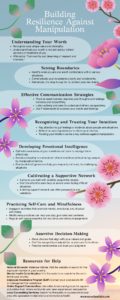 3. Meet David. He’s been a dedicated employee at his company for years. But there’s a problem – his colleague, John. John has a habit of subtly undermining David. He often takes credit for David’s ideas in meetings and makes dismissive remarks about David’s contributions. At first, David thought he was being overly sensitive, but over time, he realized this was a deliberate tactic of manipulation. John’s behavior left David feeling undervalued and questioning his own competence.
3. Meet David. He’s been a dedicated employee at his company for years. But there’s a problem – his colleague, John. John has a habit of subtly undermining David. He often takes credit for David’s ideas in meetings and makes dismissive remarks about David’s contributions. At first, David thought he was being overly sensitive, but over time, he realized this was a deliberate tactic of manipulation. John’s behavior left David feeling undervalued and questioning his own competence.
David’s interaction with John in the workplace underlines the subtle nature of manipulation in professional settings. It’s a lesson in recognizing when colleagues use tactics like undermining and credit-stealing, and the need to assert one’s contributions confidently.
- Have you faced a situation like David’s at work? How did you assert your contributions?
- Actionable Advice: In cases like David’s, document your contributions and achievements. This record can be invaluable during performance reviews or when addressing credit-stealing issues with supervisors.
Family Pressure:
4. Then there’s Jenna. Her parents have always had high expectations for her career and personal life. Initially, Jenna tried to meet these expectations, but it never seemed enough. Her parents would use emotional appeals and guilt to steer her decisions, from her job choices to the people she dated. This constant pressure was a form of manipulation, impacting Jenna’s ability to make decisions for her own happiness.
Jenna’s situation with her parents illustrates how manipulation can stem from those closest to us, driven by their expectations and desires. This story serves as a reminder of the importance of pursuing personal happiness and autonomy, even in the face of family pressure.
- Have family expectations ever felt manipulative in your life? How did you find your own path?
- Actionable Advice: Setting clear personal goals and communicating them to your family can help. It’s important to assert that while you value their input, your life choices must ultimately align with your own aspirations and happiness.
Online Manipulation:
 5. Finally, consider Maya’s story. She connected with someone online who seemed perfect. However, as their relationship progressed, Maya noticed troubling patterns. This person would shower her with affection but would become emotionally manipulative if she didn’t respond immediately to messages. They used guilt-tripping and emotional blackmail, making Maya question her own feelings and actions. This experience opened Maya’s eyes to how manipulation can even extend into our digital interactions.
5. Finally, consider Maya’s story. She connected with someone online who seemed perfect. However, as their relationship progressed, Maya noticed troubling patterns. This person would shower her with affection but would become emotionally manipulative if she didn’t respond immediately to messages. They used guilt-tripping and emotional blackmail, making Maya question her own feelings and actions. This experience opened Maya’s eyes to how manipulation can even extend into our digital interactions.
Maya’s online experience is a cautionary tale about the modern landscape of digital relationships, where manipulation can hide behind screens. It teaches us to be vigilant of the signs of emotional manipulation, even in the digital realm, and to trust our instincts when something feels off.
- Have you experienced manipulation in online relationships? What warning signs did you notice?
- Actionable Advice: Maintain a healthy skepticism in online relationships. If someone’s behavior online starts to feel manipulative, trust your instincts and consider stepping back from the interaction to reassess the relationship’s health.
Emotional Connection:
Reading about Sarah, David, Jenna, and Maya might have felt like holding up a mirror to your own life. That’s because their stories are so real – they show us how manipulation sneaks into different parts of our lives, from love to friendship, family, work, and even our online world.
These stories might hit you right in the heart because they remind us of times we’ve been there too. Ever had that sinking feeling in your gut when you realized someone was playing games with your feelings? It’s something a lot of us have gone through.
By sharing these stories, I’m hoping we can all learn something valuable. It’s not just about spotting someone else’s tricks; it’s about understanding our own feelings and standing up for ourselves. We’re all in this together, learning how to keep our relationships honest and true.
 How do you protect yourself from being manipulated?
How do you protect yourself from being manipulated?
- Awareness: Recognize the signs of manipulation, such as guilt-tripping, gaslighting, or excessive flattery.
- Set Boundaries: Clearly define and communicate your limits. Stick to them even if pressured.
- Assertiveness: Stand up for yourself respectfully. Express your feelings and needs clearly.
- Critical Thinking: Question motives and actions, especially if they make you uncomfortable or seem suspicious.
- Seek Support: Talk to friends, family, or a professional for an outside perspective.
- Trust Your Instincts: If something feels off, it probably is. Trust your gut feelings.
- Educate Yourself: Read books, articles, or attend workshops to understand manipulation tactics and defense strategies.
Standing Up for Oneself:
Let’s start with a simple truth – you’re important, and you deserve respect. This isn’t about bragging or thinking you’re better than anyone else. It’s all about learning to hold your own ground and about knowing deep down that you matter.
Learning From Personal Experiences:
Through my own experiences, I’ve learned how crucial it is to speak up and enforce boundaries, particularly when dealing with manipulation. It’s a journey, and I’m sure many of you have walked similar paths. Each of our stories is unique, yet they all teach us valuable lessons about standing up for ourselves.
Assertiveness: A Key to Handling Manipulation
Remember, standing up for yourself isn’t about confrontation. It’s about recognizing when someone is trying to undermine or control you and having the self-respect to say ‘enough.’ It’s perfectly okay to express your feelings, set your limits, and distance yourself from unhealthy dynamics. This isn’t selfishness; it’s an act of self-preservation and dignity.
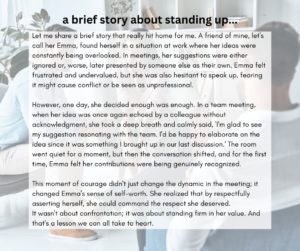 Taking Steps Towards Self-Respect:
Taking Steps Towards Self-Respect:
So, how about we all try to be a bit more assertive in our lives? It’s not about always being right or showing strength. It’s about being honest with ourselves and taking steps to protect our needs and values.
The Power of Standing Up
I’ve put together a visual story in an infographic that captures the essence of standing up for oneself…illustrating the importance of assertiveness and self-respect in our daily interactions. Check out this visual representation above to see the story unfold and gather insights on how to confidently stand your ground in challenging situations.
The Importance of Setting Boundaries:
Expressing your feelings and knowing when to draw the line is essential in dealing with manipulation. Standing up for yourself doesn’t mean seeking conflict; it means voicing your concerns when things feel off and setting clear boundaries. And most importantly, it means not allowing anyone to treat you less than you deserve.
Sure, it might sound daunting, but it’s incredibly rewarding. Each time you stand up for yourself in the face of manipulation, you reinforce your own value and self-respect. That’s a powerful and liberating act. So let’s make a commitment to ourselves to take even small steps towards recognizing and affirming our worth in every interaction. After all, respecting ourselves is the foundation upon which healthy, honest relationships are built.
Practical Tips:
So, how can you stand up for yourself? Set boundaries. Let the person know what you will and won’t tolerate. Seek support from friends or professionals who can offer guidance. Remember, it’s okay to say “no” and prioritize your well-being.
Practical Tips for Self-Empowerment
 Set Clear Boundaries: Defend your well-being by setting boundaries. Clearly articulate what behaviors you can and cannot accept. This isn’t confrontational; it’s a form of self-care and respect.
Set Clear Boundaries: Defend your well-being by setting boundaries. Clearly articulate what behaviors you can and cannot accept. This isn’t confrontational; it’s a form of self-care and respect.
Communicate Effectively: Use open and honest communication. Express your feelings using “I” statements to avoid blame. For example, “I feel overwhelmed when…” instead of “You always make me feel…”
Identify Your Limits: Know and understand your personal and emotional limits. Awareness of these limits is key to establishing them effectively.
Prioritize Self-Care: It’s vital to prioritize your mental and emotional health. If a situation or relationship is detrimental, it’s okay to step back for your well-being.
Seek Support: Reach out for support from friends, family, or professionals. External perspectives can be invaluable in managing challenging situations.
Maintain Consistency: Uphold your boundaries consistently, even if challenged. This demonstrates your commitment to your personal limits.
Respect Others’ Boundaries: Mutual respect is essential. Honor others’ boundaries just as you expect yours to be respected.
Remember, setting boundaries is an act of self-respect and an essential step towards personal empowerment.
In your journey to understand and overcome manipulation in relationships, ‘In Sheep’s Clothing: Understanding and Dealing with Manipulative People’ by George K. Simon Jr. is an invaluable resource. This book offers deep insights into recognizing and handling manipulative behavior. For those seeking practical guidance, it’s a must-read. Check it out here:For the US: https://amzn.to/3t7G6ed For Canada: https://amzn.to/3RD3vxq
Profession advice:
Understanding and navigating through manipulation in relationships is essential for maintaining trust and mutual respect. If you ever feel manipulated, remember that addressing the issue and seeking help when needed is crucial. Psychologists, Therapists, Counselors, Life Coaches, Family Therapists, Support Group Facilitators, and Legal Advisors can all provide valuable assistance.
It’s important to choose a professional who is experienced in dealing with the nuances of manipulative relationships and can provide a safe and supportive environment for healing and growth
Overcoming Manipulation:
Strategies for Change: It’s time to turn the tables on manipulation. We’ll explore effective strategies for changing the dynamics in your relationship. From assertive communication to setting clear boundaries, these tools will help you regain control over your life.
Seeking Support:
Remember, you’re not alone on this journey. Reach out to friends, family, or professionals who can provide guidance and a listening ear. Support is a powerful ally in your quest to break free from manipulation.
Above is an infographic titled ‘Spot and Stop Manipulation: Tactics and Counter-Strategies’ that visually summarizes key points from this article. It’s designed to provide a quick, at-a-glance guide to recognizing and dealing with manipulation in your daily interactions.
I hope the ‘Spot and Stop Manipulation’ infographic above has given you a clearer, more visual understanding of the tactics and strategies discussed in this article. Remember, being informed is the first step towards empowerment. If you found this useful, keep it handy for future reference or share it with others who might benefit from this knowledge.
While we’re unraveling the complex web of manipulation in relationships, there’s a crucial side of the story that we often overlook – our own role in it. It’s a bit of a tough pill to swallow, but it’s true: sometimes, without even realizing it, we might be the ones doing the manipulating.
The Journey of Self-Awareness
I believe in honesty and introspection, especially when it comes to difficult topics. Like many of you, I’ve been on a journey of self-awareness, constantly learning and growing.
The Imperfections in Our Intentions
And one thing I’ve realized is that none of us are perfect. Even with the best intentions, we might occasionally find ourselves slipping into manipulative behaviors. It could be as subtle as sugarcoating the truth to avoid conflict, or as complex as guilt-tripping someone, albeit unintentionally.
Self-Growth: Beyond Self-Blame
Acknowledging this isn’t about self-blame; it’s about self-growth. It’s about recognizing these moments in ourselves, understanding why they happen, and learning how to communicate more authentically. I’m constantly working on this myself, striving to be as transparent and honest as I can in my relationships.
How do I stop myself from being manipulative?
To stop being manipulative, first, be aware of how you act in conversations. Think about whether you’re being fair to others’ feelings. Speak honestly and clearly, without trying to control the situation. Try to understand how others feel and see things. If this is hard, ask for honest opinions from friends or maybe a counselor. It’s important to say what you need directly, not through hidden ways. Change takes time, so be patient with yourself as you learn to communicate more openly and respectfully.
Your Stories, Our Learning
I’m sharing this because I believe in the power of collective wisdom and self-reflection. Have you ever caught yourself in a moment of unintentional manipulation? How did you recognize it, and what did you learn from it? Your experiences, your stories, and your insights are not just welcome; they’re essential.
Life learning and growing
Let’s navigate this journey together, learning not just about how to deal with manipulation from others, but also how to recognize and refine our own actions.
In our quest for self-awareness, ‘The Dance of Deception’ by Harriet Lerner offers profound insights into our subtle manipulative behaviors. This book guides us in exploring the nuances of truth and deception in our interactions, encouraging a path towards more authentic and honest relationships. If you’re seeking to understand and improve the way you communicate and relate to others, this is a vital read. Discover more: For the US: https://amzn.to/46RRFnD For Canada: https://amzn.to/3RCKR8M
Conclusion:
In our exploration of manipulation in relationships, we’ve uncovered its forms, signs, and the impact it can have on individuals. We’ve also shared relatable stories and practical tips on standing up for oneself. But the journey doesn’t end here.
It’s time to reflect on your relationships. Are you experiencing manipulation? Take a step towards change. Seek help, set boundaries, and remember that your worth is non-negotiable.
As you embark on this journey of transformation, know that change is possible. You have the strength to overcome manipulation and build healthier, more respectful relationships. The future is bright, filled with empowerment and the promise of genuine connections.
Explore More on Your Journey to Personal Growth and Well-Being: 📚 👓
Recommended Professional Articles:
- Understanding Emotional Manipulation: Gain a deeper understanding of emotional manipulation and its effects. This article from Psych Central provides an in-depth look at the signs of psychological and emotional manipulation, helping you recognize and navigate these challenges. Read more on Psych Central.
- The Psychology of Manipulation: Delve into the psychological mechanisms behind manipulative behaviour with this detailed resource from Kevin W. Grant. This article offers a deeper understanding of how manipulation works and how it affects individuals. Read more here.
These articles are designed to support you on your journey to better health, wellness, and personal empowerment. I hope you find them valuable and enriching.
if you have enjoyed this post… Please send me some love…share, like and comment ❤️
Connect with Me! For daily doses of inspiration, heartfelt stories, and game-changing wellness strategies, make sure to stay connected.
Natalie Fletcher
Visit my website: RaysofSunlight
Follow me on Facebook: Natalie Fletcher
True Balance Nanaimo: Facebook Page
Connect with me: Linktree
Reach out via Email: 8TrueBalance@gmail.com
Ready to level up your life, both in wellness and wealth? Let’s start this transformative journey together!
Discover more from TrueBalance
Subscribe to get the latest posts sent to your email.

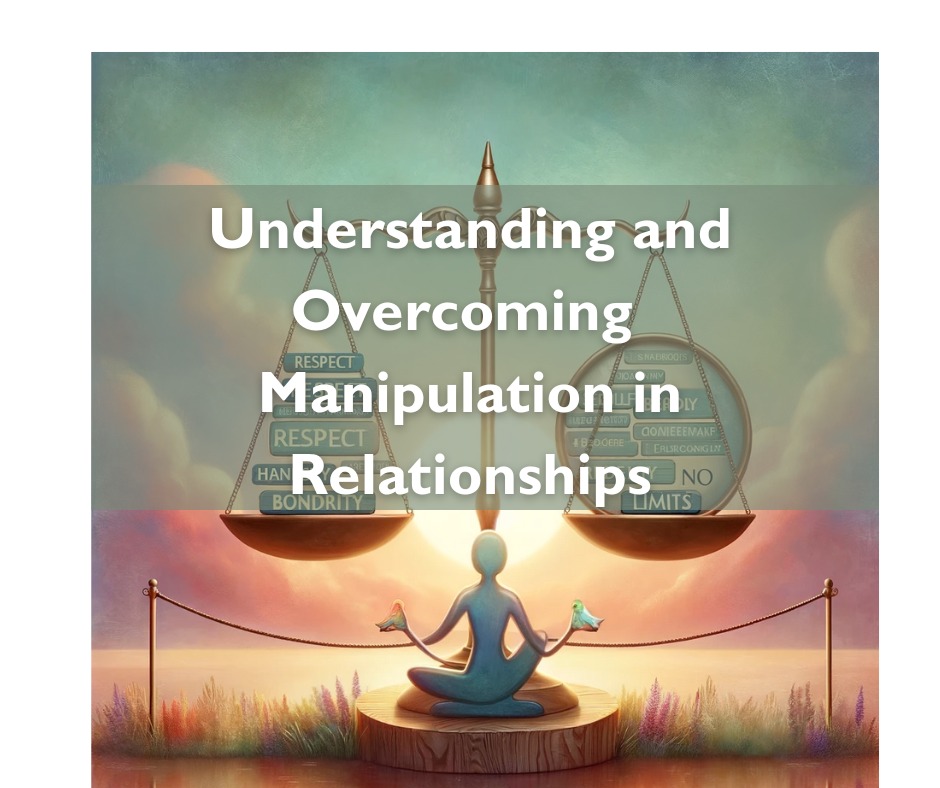
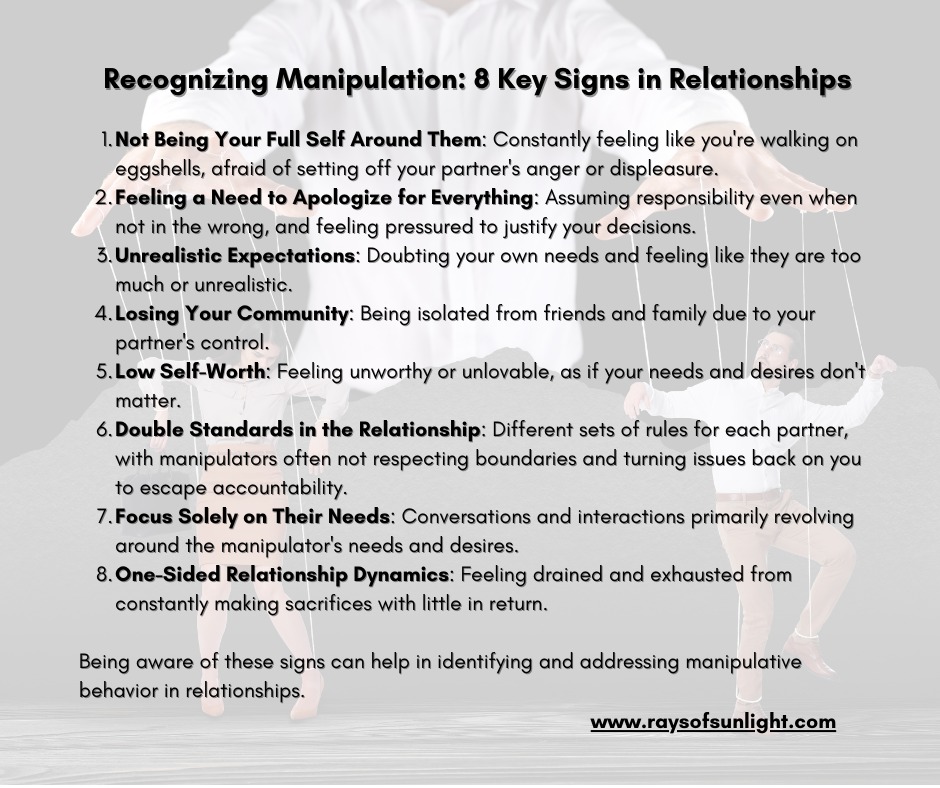

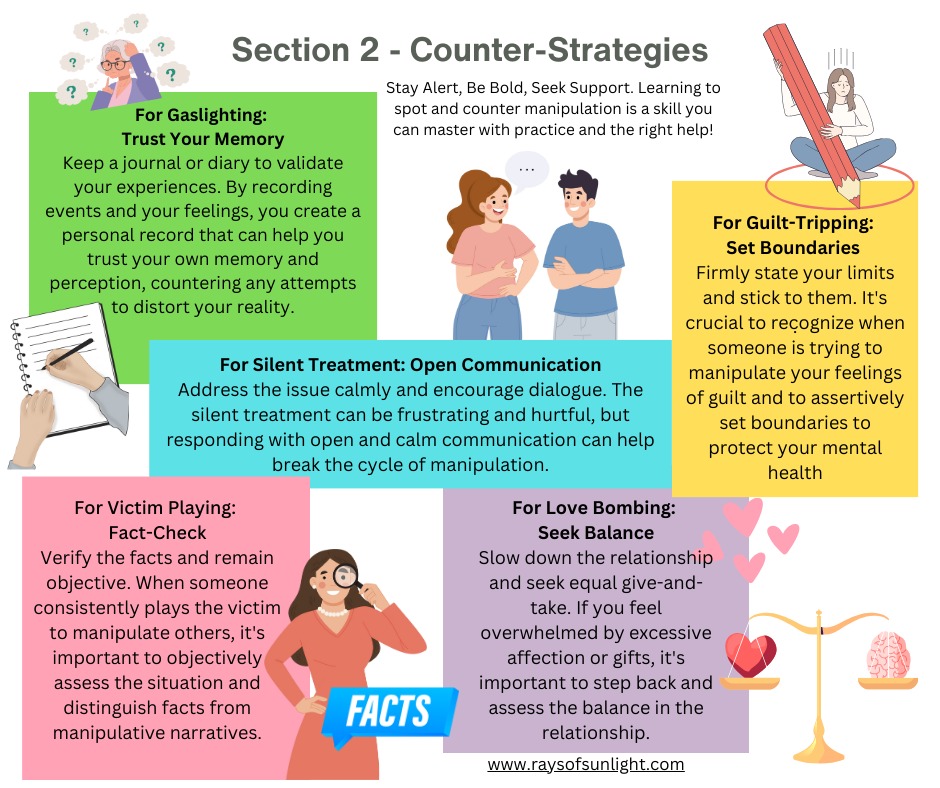

I have been with my man for many years.
Lately manipulate me. Tells me I’m losing my mind. Pits me against my friends, family.
Mostly weekends are the worst. Plus I’m taking care of my Mother that has Alzheimer’s. Says I’m getting like her.
He’s always putting me down, telling me “ I said this” and I said “that”. When I know I didn’t. But going up against him is a game I can’t play along with.
I have a lot on my plate and I’m about to go crazy.
I can’t go anywhere and he knows it. He has said things to my friends that they believe him and quit talking to me.
Lord please help me.
Hi Kim,
Firstly, I want to thank you for trusting our community with your story. It takes a lot of courage to open up about such personal struggles, and I want you to know that your feelings and experiences are valid and heard. It sounds like you’re carrying a lot on your shoulders, especially with the responsibility of caring for someone with Alzheimer’s. That’s a huge task, and it’s natural to feel overwhelmed.
It’s not okay for anyone to make you feel bad or question your sanity. It’s really tough when people you trust start doubting you, but remember, you know yourself best and dealing with that on top of caregiving, can really make things feel even more intense. It’s important to remember that your feelings are yours and it’s okay to feel like it’s all too much.
Sometimes talking to someone outside of the situation can help more than you realize. This could be a counselor or even a trusted friend. They can offer support and help you see things from a different perspective.
Also, it might be worth thinking about getting some additional support for caregiving. This could mean looking into respite care options or caregiver support groups. These services can give you some much-needed breaks and connect you with others who understand exactly what you’re going through.
Taking care of yourself is so important. It’s not selfish to take breaks or ask for help. In fact, it’s crucial for your own well-being. You’re doing an incredible job, but, everyone needs a help sometimes.
Stay strong, and please keep us updated if you feel comfortable doing so. Sending you strength and support.
Natalie
Thank you Natalie.
I do need someone to come to my home to watch over mama.
That way John and I can get away for a few hours.
I believe that part of our relationship needs both of us to connect.
Go on a date night or just out to dinner.
Maybe he feels left out?
What do you think?
Hey Kim,
I’m glad you’re thinking of setting aside some time for a date night with John. It’s a brilliant idea and such an important step for nurturing your relationship amidst everything else you’re handling.
When you have this time together, it might be a good opportunity to share your feelings in a gentle, non-confrontational way. You could start the conversation by expressing how much you value your relationship and appreciate his support, especially during these challenging times. This positive beginning sets a supportive tone for what follows.
Then, in the same caring spirit, you can bring up how certain comments he has made have been difficult for you. It’s really important for him to understand the impact of his words. Often, people don’t realize the effect they have until someone brings it to their attention. Framing this part of the conversation with how much you value and need his support can make it easier for him to hear and understand your perspective.
Remember, your feelings are valid, and expressing them is a key to a healthy relationship. It doesn’t have to be a heavy or confrontational discussion. It’s about opening up a channel of understanding and empathy between the two of you.
You’re doing an amazing job, and it’s okay to ask for help when you need it, whether it’s with caregiving or in your relationship.
Take care, and let me know how your date night goes.
Warm wishes,
Natalie
Thank you so much. I will take heart to what you said.